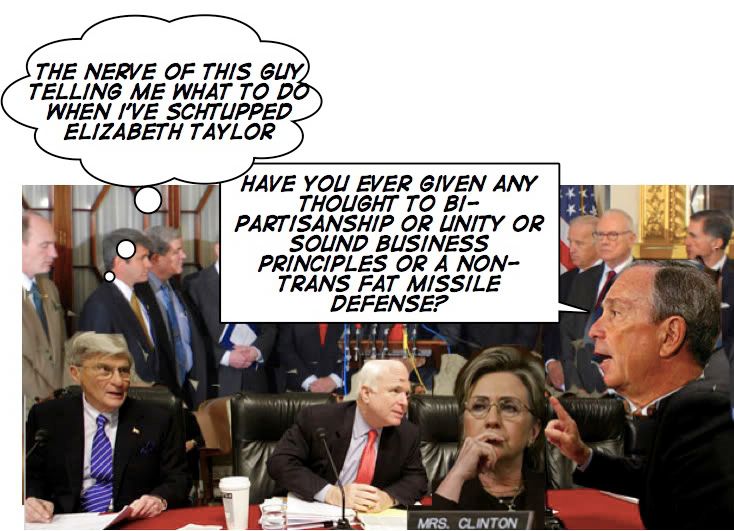 reality based educator over at nyceducator has a great post on
reality based educator over at nyceducator has a great post on
Mike's criticism of the foreign policy platforms of McCain and Hillary:
He's already in full pander mode, bashing the current crop of presidential candidates over and over again for coming up short on every major issue.
For instance, in this early January speech, the foreign policy experience-less Bloomberg criticized candidates like John McCain and Hillary Clinton who sit on the Senate Armed Services Committee for not telling America how they will handle foreign policy post-Dubya:
"I have not heard anybody who's said what they'd really do when it comes to foreign policy, how they would rebuild the relationships America has around the world," Bloomberg said.
I guess Moneybags is too busy cranking out the standardized tests here in NYC to have noticed that both McCain and Clinton have explained just how they would do that.
First, Clinton's plan:
New York Senator Hillary Clinton called for a broad reform of US foreign policy that would include better cooperation with other nations and bilateral talks with enemy nations. Criticizing President George W. Bush's foreign policy from Iraq to Afghanistan and North Korea to Iran, the wife of former president Bill Clinton called for a more internationalist approach to foreign policy in a speech at the Council on Foreign Relations, a New York-based foreign policy think tank. "First, and most obviously, we must by word and deed renew internationalism for a new century," said Clinton, a likely Democratic Party presidential candidate for the 2008 election. "We did not face World War II alone, we did not face the Cold War alone, and we cannot face the global terrorist threat or other profound challenges alone either," she said. Clinton also defended the idea of bilateral talks with nations that Washington has been avoiding, such as Iran and Cuba. "We must value diplomacy as well as a strong military," Clinton continued. "We should not hesitate to engage in the world's most difficult conflicts on a diplomatic front." "Direct negotiations are not a sign of weakness; they're a sign of leadership," she said. Clinton blasted what she said was the Bush administration's "simplistic division of the world into good and evil. They refuse to talk to anyone on the evil side, as some have called that idealistic. I call it dangerously unrealistic."
Now McCain's:
Defeating radical Islamist extremists is the national security challenge of our time. Iraq is this war's central front, according to our commander there, General David Petraeus, and according to our enemies, including al Qaeda's leadership. The recent years of mismanagement and failure in Iraq demonstrate that America should go to war only with sufficient troop levels and with a realistic and comprehensive plan for success. We did not do so in Iraq, and our country and the people of Iraq have paid a dear price. Only after four years of conflict did the United States adopt a counterinsurgency strategy, backed by increased force levels, that gives us a realistic chance of success. We cannot get those years back, and now the only responsible action for any presidential candidate is to look forward and outline the strategic posture in Iraq that is most likely to protect U.S. national interests.
Defeating the terrorists who already threaten America is vital, but just as important is preventing a new generation of them from joining the fight. As president, I will employ every economic, diplomatic, political, legal, and ideological tool at our disposal to aid moderate Muslims -- women's rights campaigners, labor leaders, lawyers, journalists, teachers, tolerant imams, and many others -- who are resisting the well-financed campaign of extremism that is tearing Muslim societies apart. My administration, with its partners, will help friendly Muslim states establish the building blocks of open and tolerant societies. And we will nurture a culture of hope and economic opportunity by establishing a free-trade area from Morocco to Afghanistan, open to all who do not sponsor terrorism.
You may not like either Clinton or McCain as people, you may not like them as candidates, but the one thing you cannot say is that they have not stated pretty explicitly how they would handle foreign policy in the post-Dubya era.
You also cannot say that 8 years on the Armed Services Committee for Clinton and 20+ years for McCain does not give them some experience with foreign policy (even if you don't happen to agree with how they plan to handle it in the post-Dubya era.)
But I guess if you have $20 billion dollars and you're a potential candidate for president, you can say it and get away with it.















0 Comments:
Post a Comment